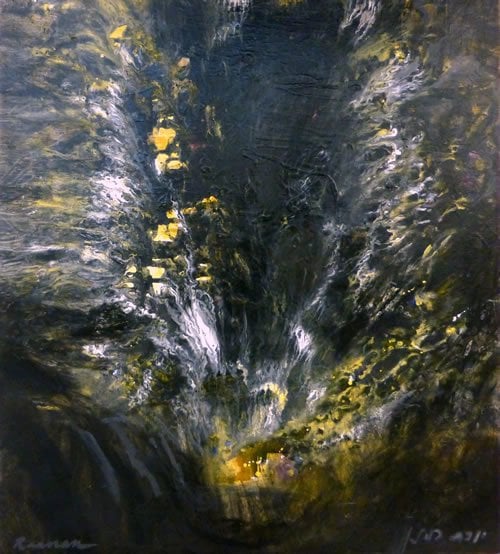Korah (Korach) was the leader of a rebellion against Moses and his brother Aaron, during the journey of the Israelites from Egypt to the Land of Israel. As punishment, he met his end by miraculously being swallowed up by the earth. His story is told in the Book of Numbers, in the portion known as Korach.
Korah, the Man of Stature
Korah1 was a great-grandson of Levi, the third of Jacob’s twelve sons, and a first cousin to Moses and Aaron, the Jewish leader and High Priest, respectively.
Korah was born in Egypt,2 at the time when the Jews were enslaved to King Pharaoh. He experienced the miraculous Exodus from Egypt and journey through the Red Sea on dry land, and received the Torah at Mount Sinai along with the rest of his brethren.
Korah was extremely wealthy,3 and was a clever and astute individual.4 His status as a member of the Levite tribe enabled him to participate in the service in the Mishkan, the portable sanctuary the Jews carried with them throughout their journey to the Promised Land.
Despite—and because of—his many qualities, he felt able to take a stance against Moses and Aaron, which ultimately led to his downfall.
Read More: Who Was Korach?
Korah’s Rebellion
Korah was jealous of the fact that Aaron had been chosen as High Priest, to the exclusion of anyone else. Furthermore, his cousin Elitzafan had been chosen as head of the Levite family of Kehot, to which Korah belonged,5 and Korah felt this position was rightfully his.
These personal grievances led Korah to stage a full-blown rebellion. Accompanied by Dathan and Abiram, troublemakers since their early days in Egypt, he rallied an additional 250 community leaders to his cause. Together, they confronted Moses and Aaron and claimed that he had appointed his brother as High Priest on his own accord, without being instructed to do so by G‑d. They further demanded that they all be allowed to serve as High Priests.
Moses responded that this was impossible, as only one person could assume this sacred post. To demonstrate that Aaron was indeed Heavenly ordained, he instructed them all to take pans the next day and offer ketoret (incense) before G‑d, and G‑d would accept the sacrifice of the one whom He deemed worthy.
Korah’s group grew in size, as throughout the night he lured thousands to his side. The next day, the 250 men approached the sanctuary with their incense-filled pans.
Miraculous Demise

At this point, Moses warned the Jews to stay clear of the tents of Korah, Dathan and Abiram. Addressing the crowd, he foretold of the punishment that would befall them: the earth would open its mouth and swallow them alive.
As Moses finished speaking, the earth indeed opened up and swallowed Korah and his two cohorts along with their families and possessions, never to be seen again. At the same time, a Heavenly fire went forth and consumed the 250 incense-bearers.
The Aftermath
As a reminder to the nation of the calamitous outcome of the rebellion, Aaron’s son Elazar was instructed to melt the pans and craft them as plates to cover the Tabernacle altar.
To further demonstrate that Aaron was Divinely chosen, each tribe was instructed to give a staff to Moses, upon which was inscribed the name of the tribe’s leader. On the staff of the tribe of Levi, Aaron’s name was inscribed. Moses placed the staffs in the sanctuary before the Ark of the Covenant, and the next morning, Aaron’s staff was discovered to have miraculously flowered and produced almonds.
Read More: Fruit on the Staff
Additionally, G‑d solidified Aaron’s position by bestowing upon him and his sons twenty-four priestly gifts.
Korah’s Descendants
At first, Korah’s three sons, Asir, Elkanah and Aviasaf, joined in their father’s quarrel. However, soon after, they regretted their actions and repented. As a result, they were spared their father’s fate and survived.6 Indeed, Korah’s descendants were among the Levites who sang in Holy Temple,7 and a number of psalms in the Book of Psalms8 were either composed or sung9 by them. Among Korah’s descendants was the famed prophet Samuel, anointer of the first kings of Israel, Saul and David.10
Of Blue Threads and Doorposts

The Midrash fills in some of the drama of Korah’s uprising. Korah tried to undermine Moses by pointing to laws he viewed as illogical.
He began by focusing on the mitzvah of tzitzit, the commandment to attach strings to the corners of our garments, one of which should ideally be wool that is dyed blue or purple.11 Korah prepared 250 cloaks without tzitzit, but which themselves were fashioned from similarly dyed wool, and handed them out to his supporters. “Do these cloaks require tzitzit?” he asked. “Yes, they do,” Moses replied. They began to mock: “For a garment of another color one dyed wool string is sufficient, yet when an entire garment is dyed, its very color is not sufficient?!”
Read more: Hanging by a Thread
Korah continued to challenge Moses: “Does a house filled with Torah scrolls require a mezuzah [the parchment affixed to the doorpost, in which the Shema prayer is written]?” “Yes, it does,” Moses replied. “If an entire Torah scroll does not suffice,” Korah taunted, “how can a single paragraph be enough?! You did not receive these commandments from G‑d; you devised them on your own!”12
In the Hands of the Woman
Another Midrashic passage contrasts Korah and another former crony named On ben Peleth. Focusing on the verse in Proverbs,13 “A wise woman builds her home, while a foolish one destroys it,” the Talmud states: “A wise woman builds her home—this refers to the wife of On ben Peleth; A foolish one destroys it—this refers to the wife of Korah.”
What happened? Korah alone would not have instigated this argument, if not for his wife’s insistence and encouragement. On’s wife, on the other hand, saved her husband from meeting the same fate as his colleagues.
After convincing him to abandon their ranks, he asked: “What should I do? I joined in the conspiracy, and swore that if they will summon me, I will go!” “Don’t worry,” she replied. “I’ll take care of it.”
After giving her husband strong wine to drink and putting him to sleep in their tent, she sat at the entrance and revealed her hair, which she normally covered for reasons of modesty. Whenever someone came to summon him, seeing an immodestly-dressed woman at the entrance to the tent, he would turn back. Thus, his life was saved.14
Read More: A Tale of Two Wives
Korah’s Complaint: A Deeper Look

The connection of a Jew with G‑d consists of two dimensions: the spiritual connection achieved through Torah study and contemplation of the Divine, and the connection accomplished through performing G‑d’s mitzvot (commandments), the majority of which involve material activities and objects.
Korah understood that Moses and Aaron’s spiritual achievements far surpassed his. But it was with regard to mitzvahs that he disputed their supremacy. He argued that the Torah’s main focus is on the practical side of Jewish life and the physical fulfillment of G‑d’s commands. In this regard, he claimed, all Jews are equal; the donning of tefillin performed by Moshe was exactly the same as the donning performed by the simplest Jew. Why should they reign supreme here as well?
However, G‑d desires not only the physical performance of mitzvahs, but also the proper spiritual intent. Thus, while Moses and Aaron’s actual performance of mitzvahs did not differ from that of anyone else, the intent with which they performed them varied greatly, and G‑d considers the intent as well as the deed.15











Join the Discussion